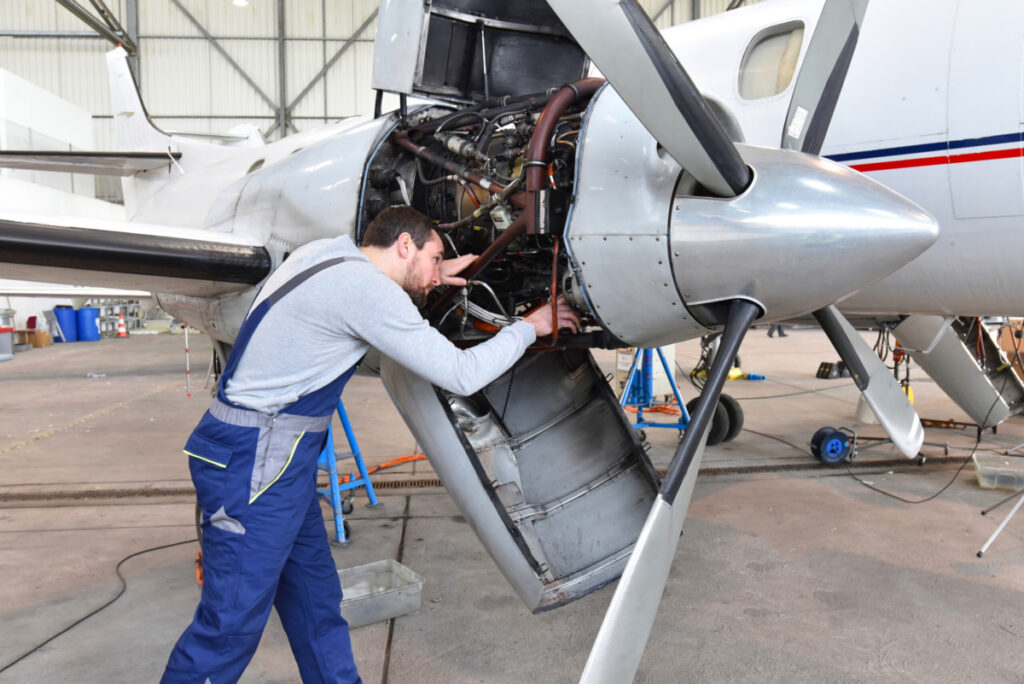The Importance of Private Aircraft Maintenance

When you step onto an aircraft, you assume it is in excellent working order and that you should have no issue getting to your destination. Passengers place a lot of trust, faith, and confidence in an aircraft maintenance technician they have never met. Why? Likely because the aircraft can get you where you want to go quickly – its history of high safety standards has proven effective. Let’s look at the importance of routine aircraft maintenance for private jets.
Understanding Airworthiness
For an aircraft to function correctly, it has to be in well-functioning order. It should work as the manufacturer intended and have all routine repairs and maintenance taken care of on schedule. FAA regulations and compliance standards must be met for a jet to be considered flight worthy. When a private jet charter is airworthy, the risks and dangers of flying are significantly reduced.
What’s Included in Routine Aircraft Maintenance?
When you think of routine aircraft maintenance, it may be easy to assume it is equivalent to changing your car’s oil every 3,000 miles. Changing the oil may work for most vehicles, but jets require a lot more. By routine, it is a regular practice, like before and after a fight, at certain fight hours, and so forth. All maintenance is thoroughly logged to ensure records are kept, including the repair’s details.
Pre-Flight Routine Checks
The pilot is responsible for always doing a pre-flight checklist before doing anything else. They are to make sure that there are no defects and no malfunctions. And, believe it or not, this includes the aircraft’s inside and outside. Pilots look for anything that can impact the flight’s safety, such as defects, wear and tear that hasn’t been addressed, and anything else that could cause alarm. They check the cockpit, the cabin, the avionics, the battery, and so forth to ensure everything is in working order.
50-Hour and 100-Hour Inspections
Charter jets are required to have logs for every 100 hours the plane is in flight. It is recommended that a check be performed at 50 hours, too. This only makes sense since the oil in a jet needs to be changed every 50 hours. It is also a good idea to look over the jet’s engine and other working parts and clean the spark plugs. The FAA mandates 100-hour inspections under FAR 91.409b. At this time, all significant components of the jet are carefully inspected. All areas of inspection, including (but not limited to) the:
- Engine
- Windows
- Seatbelts
- Flight controls
- Fuselage
- Cabin doors
- Cargo doors
- Tires
- Brakes
- Landing gear
- Struts
The inspection plates, access doors, fairings, and cowlings are removed. Plus, the oil must be changed, and the spark plugs cleaned. Anything discovered during this inspection must be addressed appropriately and repaired/ replaced. Aircraft inspections allow technicians to address any areas of concern, no matter how big or small. And that means taking care of them before they get worse.
Annual Inspections
Another mandated review by the FAA, the aircraft needs to be thoroughly inspected annually regardless of their use. Details of the assessment are found in FAR 43 Appendix D. While this is quite similar to the 100-hour inspections, this annual inspection is a little more detailed.
Progressive Inspections
Sometimes jets have heavy bookings, and routine inspections can keep them grounded for quite some time. To keep things flowing smoothly, many partake in progressive assessments. These are performed in set intervals, say every 25 hours or so. Each component is inspected when it is time for the 100-hour inspection. The routine maintenance ensures that each jet is thoroughly monitored to make it is flight worthy.
Who Is Qualified to Perform Aircraft Maintenance?
The Federal Aviation Administration (FAA) is in charge of those in this industry, including those who perform maintenance. Because the job is so important and lives are at stake, they must maintain the proper certification. Aviation maintenance technicians, or airplane mechanics, are formally trained. They must meet specific training milestones and pass an oral, practical, and written test to be certified by the FAA as Airframe and Powerplant (A&P) technicians. Obtaining the license requires proving ability through these exams.
Why Routine Aircraft Maintenance Is Important
Logically, we know that routine aircraft maintenance is essential because it keeps the jet working correctly and in its best shape. We also know that it keeps the flight crew and the passengers safe. But when it comes to routine aircraft maintenance, there are other reasons it is crucial. Caring for a jet will keep it looking and running like a charm. This will create greater longevity, minimize the incidence of flight cancellation, reduce the need for (and the cost of) significant repairs, and meet all flight safety regulations set forth by governing bodies.
Unexpected Maintenance
While most aircraft maintenance is regularly scheduled, jets sometimes require unexpected maintenance. Sometimes a component may not be working correctly or be in jeopardy of malfunctioning. The pilot may notice something during the pre-flight routine check. Anytime this happens, the aviation maintenance technicians are notified to fix the issue before the next flight.
Charter Jets and Routine Care
Charter jets are often used, shuttling passengers from one destination to another. Well-respected charter companies take pride in their private aircraft maintenance services, so they always know they are ready to take flight when a booking happens. And that means that getting routine care is vital to their health – and for the safety of everyone involved.
Working with some of the most experienced aviation maintenance technicians brings confidence that the job is done well and that all replaced parts have been inspected for defects before use. When you book your private jet charter with the right company, you can count on a jet that has been properly maintained and meets some rigorous safety standards.

